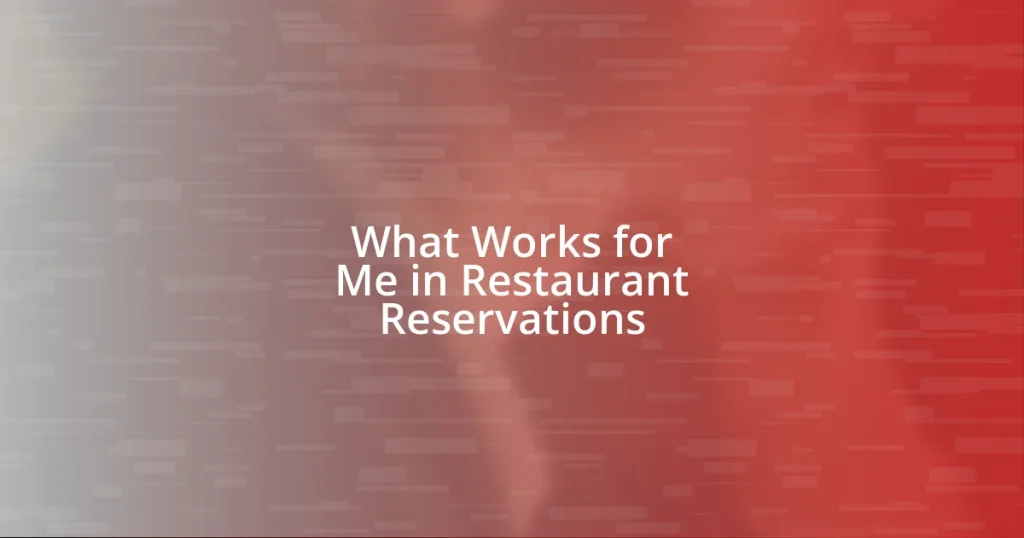Key takeaways:
- Making restaurant reservations guarantees a table, enhances the dining experience, and allows restaurants to manage resources effectively.
- Choosing the right restaurant involves considering factors like cuisine, ambiance, location, price, and reviews, which can significantly influence the dining experience.
- Effective reservation management includes using apps, confirming details beforehand, and maintaining open communication with the restaurant for any last-minute changes.
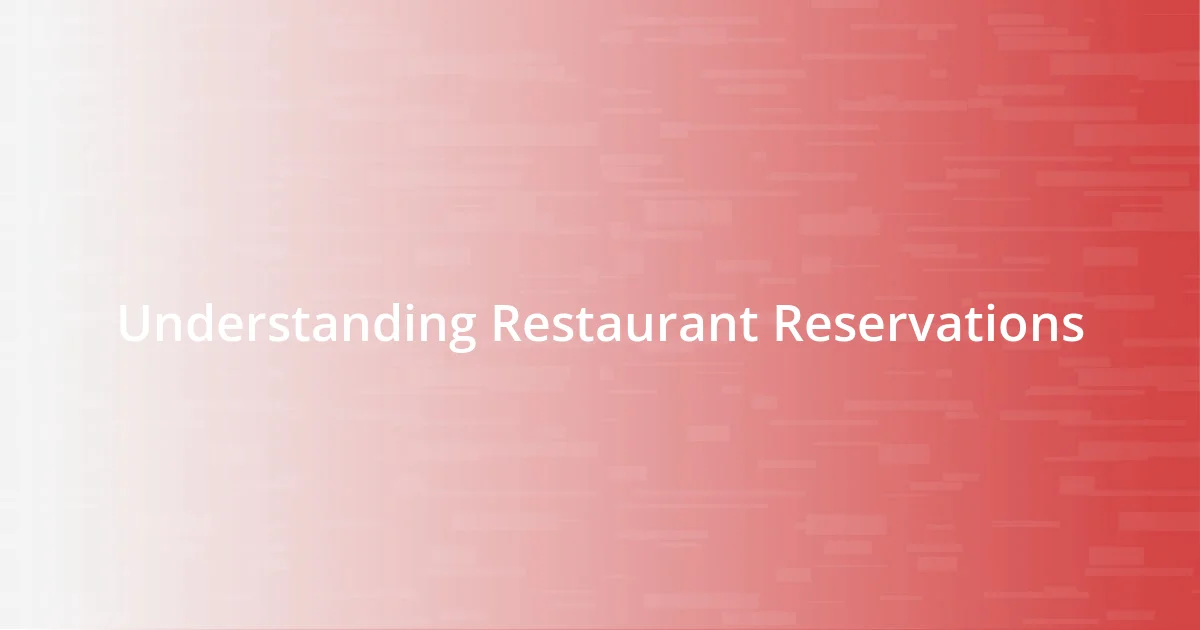
Understanding Restaurant Reservations
Understanding restaurant reservations begins with recognizing their role in ensuring a seamless dining experience. Have you ever walked into a bustling restaurant only to find out they’re fully booked? That feeling of disappointment can often be avoided with a simple reservation.
When I think back to that one special anniversary dinner, we had a table waiting for us, and it made all the difference. It allowed us to relax and enjoy the evening instead of worrying about finding a spot. Reservations not only secure your place, but they also provide the restaurant with valuable data on expected traffic, which helps them serve you better.
Have you ever wondered how restaurants manage to keep up with customer demand, especially during peak hours? By analyzing reservation trends, they can better staff their teams and prepare their kitchens, ensuring that every guest has a delightful experience. It’s a little behind-the-scenes magic that plays a significant role in your overall dining pleasure.
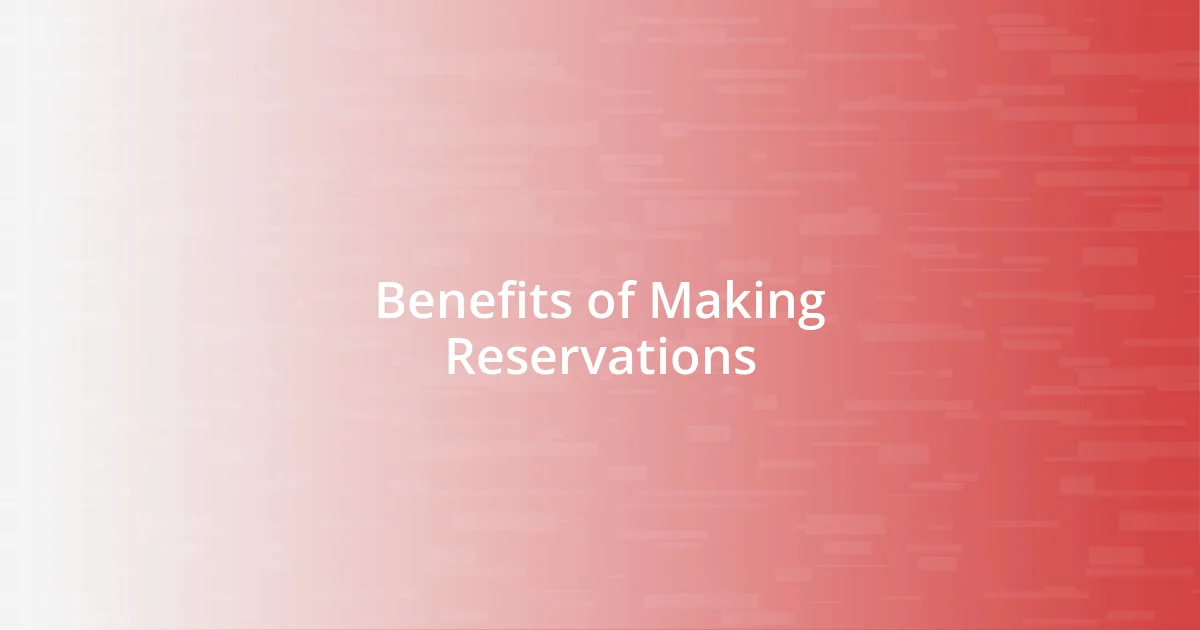
Benefits of Making Reservations
Making restaurant reservations comes with numerous benefits that enhance both the dining experience and operational efficiency for restaurants. For starters, having a reservation guarantees you a table, especially during peak dining times. I still remember the time my friends and I strolled into a popular eatery, and we waited for nearly an hour. That’s a situation I’d gladly avoid by making reservations.
Additionally, making a reservation allows diners to plan ahead, making it easier to coordinate gatherings. I love the feeling of knowing that I have a place to celebrate with friends during our monthly get-togethers. It adds an element of excitement and anticipation, transforming an ordinary dinner into a special occasion, free from the stress of uncertainty.
On the restaurant side, reservations help them manage their resources effectively. This system allows them to predict the flow of guests and adjust staff accordingly, leading to improved service quality. When I’ve dined at a well-prepared restaurant, I can always feel the difference when the staff seems relaxed and ready to cater to my needs; I know that’s no coincidence.
| Benefit | Details |
|---|---|
| Guaranteed Table | Secures your dining spot, especially during busy hours. |
| Planning | Helps organize gatherings and enhances the experience. |
| Operational Efficiency | Enables restaurants to manage staff and resources effectively. |
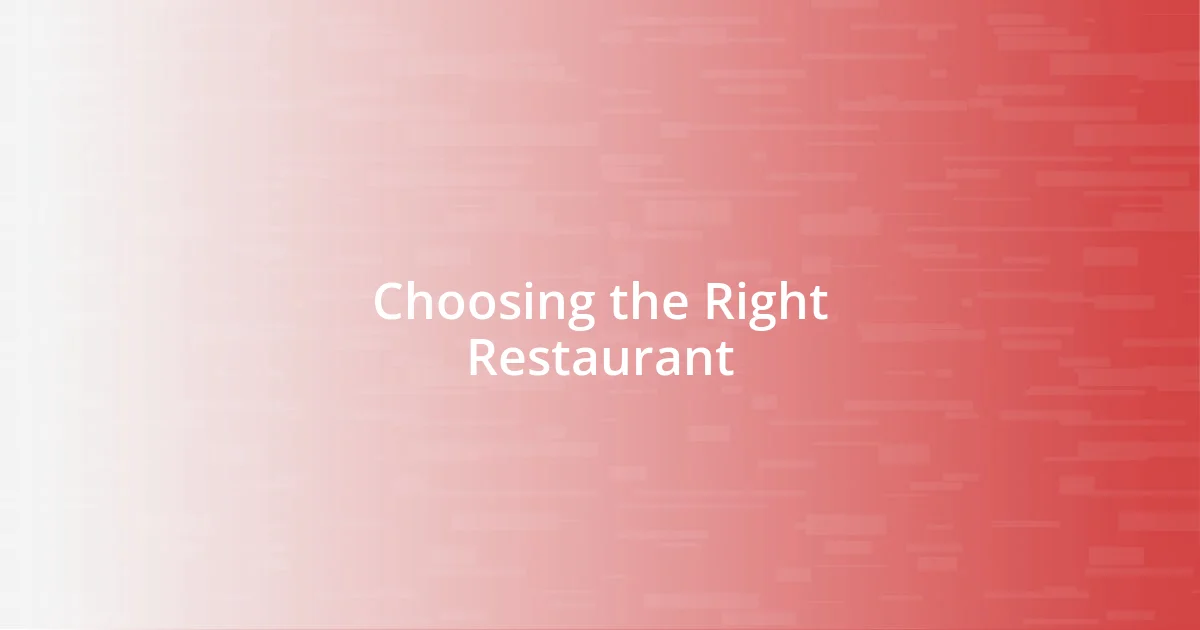
Choosing the Right Restaurant
Choosing the right restaurant can make or break your dining experience. I often spend time browsing reviews and menus online before deciding where to eat. There’s something about hearing others’ experiences that adds a layer of trust, especially when making plans with friends or family. One memorable evening, I settled on a cozy Italian restaurant after reading glowing reviews about their homemade pasta. The anticipation built up before we even set foot inside, and it turned out to be an unforgettable choice.
When selecting a restaurant, here are a few factors I consider:
– Cuisine Type: Know what you’re in the mood for, whether it’s Italian, sushi, or something else entirely.
– Ambiance: Look for a vibe that matches your occasion—whether it’s romantic, casual, or festive.
– Location: Convenience is key; I prefer spots that are easy to get to, especially for larger groups.
– Price Range: It’s crucial to be aware of your budget to avoid any surprises at the end of the meal.
– Reviews and Recommendations: Trustworthy feedback can guide you toward a memorable experience.
Thinking about all these factors truly enhances my decision-making process. I can’t tell you how many times I’ve chosen a restaurant based solely on the buzz; it’s about finding that perfect place that resonates with both my taste and the mood of the moment.
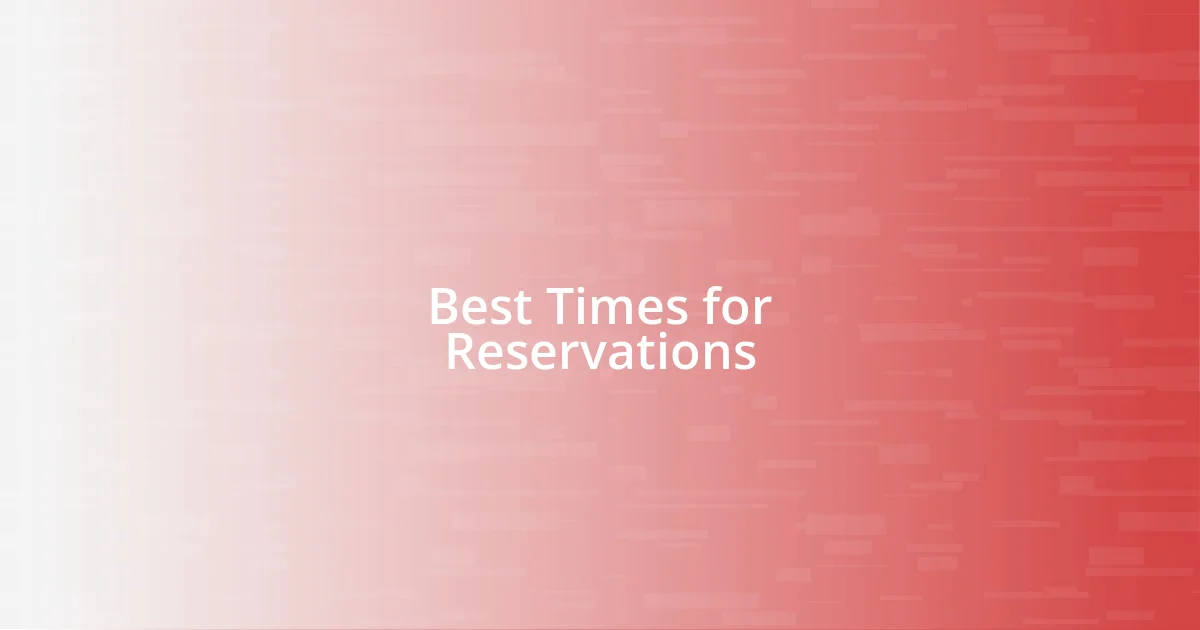
Best Times for Reservations
When it comes to making reservations, timing really is everything. Personally, I find that booking a table for dinner between 6:30 PM and 7:30 PM is ideal. It allows me to avoid the rush and gives me a better chance of enjoying a relaxed meal without feeling like I’m being hurried out the door. I can still remember that one Friday night when I opted for an earlier reservation, and it felt like we had the whole place to ourselves—what a treat!
Another great strategy is to consider weekdays rather than weekends for reservations. I often choose to dine out on Tuesdays or Wednesdays because restaurants are typically less crowded. There’s something wonderfully liberating about enjoying a meal with fewer diners around; it feels more intimate, don’t you think? I vividly recall a delightful midweek dinner at a little bistro where I was able to chat with the staff and even got introduced to the chef. It turned an ordinary dining experience into something I still talk about today.
Lastly, if you’re planning for special occasions like holidays or events, reserving well in advance is key. I learned this the hard way last Valentine’s Day when I waited too long and ended up at a place that just didn’t match my expectations. Having a reservation locked in not only secures your spot but also gives you the peace of mind to focus on enjoying the moment. Who wants to experience the stress of finding an alternate dining option on a night that should be special?
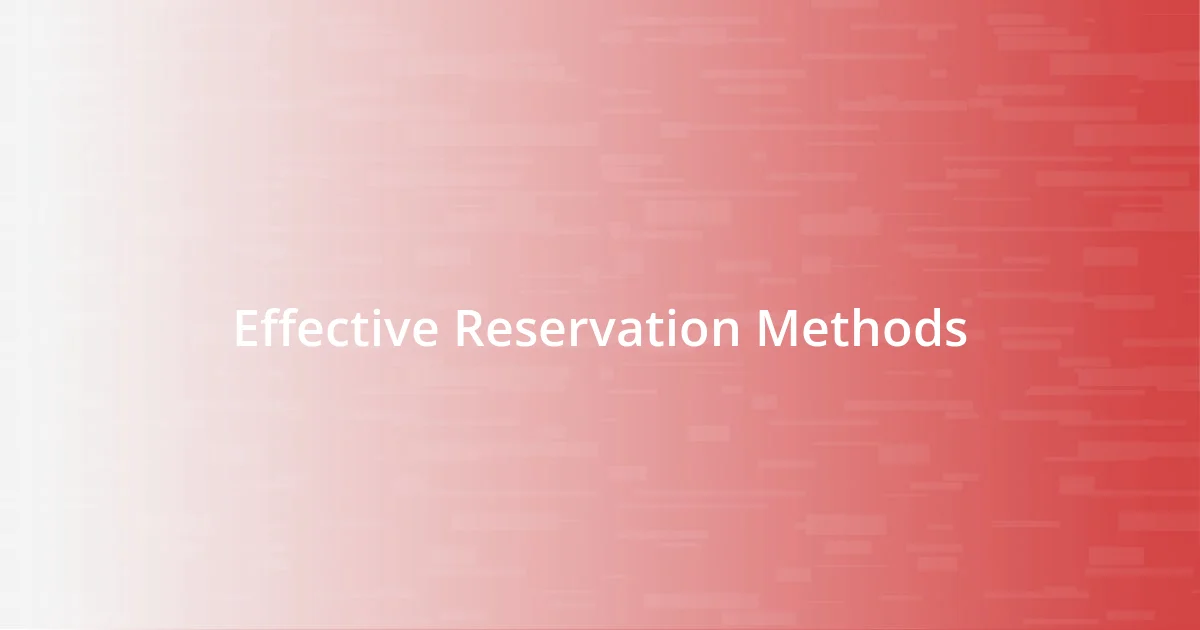
Effective Reservation Methods
When it comes to effective reservation methods, I’ve found that using restaurant apps can be a game-changer. I’ve had such positive experiences with platforms like OpenTable, where I can browse menus, check availability in real-time, and even read reviews—all in one place! It’s particularly helpful when I’m short on time; I can make a reservation in just a few taps while on the go. Isn’t it amazing how technology simplifies our lives?
In addition to apps, I’ve learned that giving a quick call to the restaurant can sometimes make a huge difference. I remember a time when an online reservation system was down, but a friendly staff member on the phone found a way to accommodate my group. By directly communicating, not only did we secure the table, but I also got insider tips about the evening’s specials. It’s these personal touches that make dining out feel more special. Isn’t that what we’re all looking for—a connection amidst the hustle?
Lastly, consider confirming your reservation before heading out. I can’t tell you how many times I’ve saved myself from a last-minute scramble by just making a quick call a few hours ahead. There was one particular occasion when a restaurant had accidentally overbooked; my earlier call allowed them to rectify the mistake before we arrived. It turns an already enjoyable outing into a seamless experience. Wouldn’t you agree that a little precaution goes a long way in ensuring a pleasant dinner?
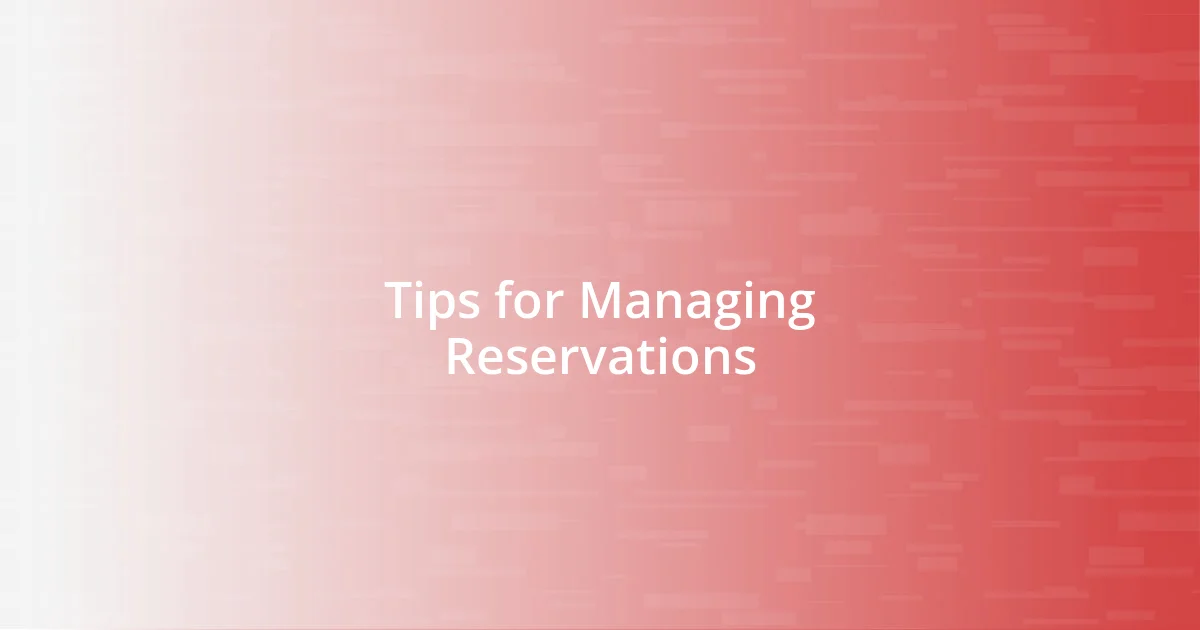
Tips for Managing Reservations
Managing reservations can be a bit tricky, but I’ve picked up a few useful tips that make the process smoother. One effective strategy is to keep a calendar or a reminder on your phone for important dining dates. This way, you can track not just your reservations but also your dining preferences, making it easier to plan your next meal out. I often find myself referring back to my previous meals to recall what I enjoyed the most. It’s like a personal database of delicious experiences!
Another great tip is to build a rapport with restaurant staff. I’ve found that chatting with the staff during my visits not only makes the experience more enjoyable but can also lead to a little extra magic when booking future reservations. On one memorable occasion, I casually mentioned to the hostess that it was my anniversary during a dinner. The next time I called for a reservation, she went above and beyond, securing us a lovely table with a view and even suggesting a special dish for the occasion. Doesn’t that personal touch elevate the whole dining experience?
Lastly, always keep your plans flexible. I remember a time when my schedule changed last minute, and I was able to shift my reservation to a different time without any hassle. Restaurants appreciate it when patrons give them a heads-up, and in return, I often get accommodated more easily when I call back. It’s a win-win! How often do we let rigidity in our plans ruin a potentially great evening? Embracing flexibility can truly turn dining into a delightful adventure instead of a chore.

Handling Last Minute Changes
Handling last-minute changes can be nerve-wracking, but I’ve learned that maintaining open communication with the restaurant can work wonders. There was a time when I had a sudden schedule change and had to call just an hour before my dinner. To my relief, the manager was understanding and quickly shifted my reservation without any fuss. Isn’t it comforting to find that kind of flexibility when you need it most?
I’ve also realized that being proactive can save you from a lot of stress. I once had a group of friends surprise me with a dinner for my birthday, and they totally forgot to confirm the reservation. A quick call to the restaurant revealed they were fully booked, but thankfully, they kindly squeezed us in for a later time. It made me appreciate how a little foresight and a simple check-in can turn a potential disaster into a cherished moment.
Sometimes, handling last-minute changes means knowing when to pivot. I remember planning to dine at a well-known spot, only to discover it unexpectedly closed. Instead of panicking, I quickly looked up a nearby alternative, which turned out to be a hidden gem! That spontaneous decision not only salvaged the evening but also introduced me to an amazing restaurant I wouldn’t have tried otherwise. Isn’t it fascinating how the unexpected can lead to even better experiences?










